Part 46: Hafid the Great
Chapter 14 – Hafid the Great – 1600 to 1615With the humiliating losses and pyrrhic victories of the sixteenth century finally coming to an end, the entrenched nobility of Al Andalus come to power in the Majlis once again, chiefly by laying the blame for Andalusia’s many defeats at the feet of the Merchants.

The sheikhs had barely congratulated one another before they were presented with a challenge: the Castilian revolt in Qila. The Majlis quickly tasked the renowned commander Abdul-Razzaq with suppressing the dissidents, which he only managed to do after massacring thousands of peasants, drenching the streets of Qila red with blood.


At the same time, in the newly-reappointed capital of Qadis, a new Sultan ascended to the throne and was coronated in an elaborate ceremony. Hafid I, crowned as the eighteenth Sultan of Al Andalus.

Though paintings and official portraits depict him as a strong and handsome young man, many contemporary writers claim that Hafid was not exactly comely. The very opposite, in fact, he had a large and ugly birthmark stretching halfway across his face, making it quite the unpleasant sight to behold.

But looks are not everything, as Hafid was determined to prove. The young Sultan is a very interesting figure in Andalusi history, chiefly because his life before becoming Sultan is murky and largely unknown. One thing we do know for a fact, however is that he was raised and personally tutored by his grandmother, the divisive Sultana Fatima, and quickly came to adopt her ruthlessness and ambition.

Another interesting aspect of Hafid’s personality is that he favoured tolerance and self-rule, at least where his subjects were concerned. Thus, in addition to personally guaranteeing the Portuguese and Castilian dhimmi, he began working towards establishing the same rights for other cultural minorities.

He faced considerable opposition from the Ulema, a large and powerful bloc in the Majlis, but persevered and managed to snatch many early victories, including allowing dhimmi peoples to maintain their own law courts and governmental institutions.

Hafid could not bring a complete halt to the Ulema’s efforts, however, which yielded results as several major cities in Catalonia came to be dominated by Sunni Muslims, though significant Christian minorities survived.

The new Sultan’s focus turned to inward development soon afterward. The government still owed massive sums of gold to the moneylenders in Qadis, and debts was damaging to both the sultanate and its reputation, so repaying these loans became Hafid's primary objective in his early months of power.

Actually acquiring the money, however, meant channeling it in from somewhere else. So Hafid’s eyes turned westward, where he awarded exclusive grants to several trade companies allowing them to monopolise trade in different regions of Gharbia, with the crown taking a hefty percentage of the proceeds.

There were plenty of other problems in the new world that required Hafid's immediate attention, however, primarily that of Juzur Qarbiya. The Muqti’s recent efforts to gain more autonomy was worrying the lords of the Majlis, so with the permission of the Sultan, a number of diplomats were dispatched to try and ease relations with the governor.

For a time this proved sufficient, with relations between crown and colony slowly strengthening, but a sudden reversal just a year later made all of these efforts pointless, with news arriving in Qadis that the Muqti had formed a ‘colonial assembly’ to seize greater control over trade and domestic diplomacy.

This development was met with uproar in the Majlis, and though the Sultan cautioned patience, both nobles and merchants demanded aggressive actions against the Muqti for his transgressions. Before anything could actually be done about it, however, the western winds carried more bad news to Qadis...
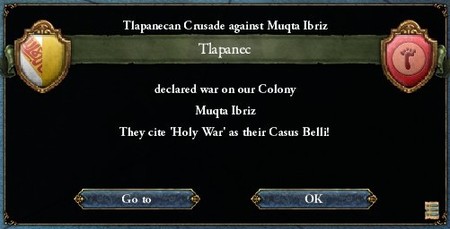
The Tlapanec Empire, the principal native power in Gharbia, had apparently crossed the border and into Andalusi territory a few months prior. They demanded that the Muqta of Ibriz – a young and weak Andalusi colony – abandon their settlements along the border.
Sultan Hafid immediately sent the natives a time limit of one month to pull their troops back, but the Tlapanec Emperor arrogantly thrust the demands into a fire and proclaimed his control over all Gharbia.
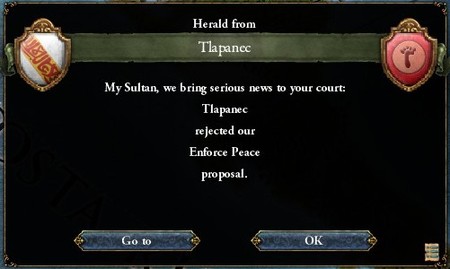
Both the Sultan and his Majlis had expected him to do just that, so this message was quickly followed by the entirety of Andalusia’s mercenary army, still controlled and led by the general Abdul-Razzaq.

Upon landing off the coast of Ibriz, Abdul-Razzaq was brought up to date as to the developments thus far. Once he had enough information he pressed forwards and recaptured large tracts of land that had been lost to the natives, following this up by crossing the border into Tlapanec territory and engaging a large 30,000-strong army.
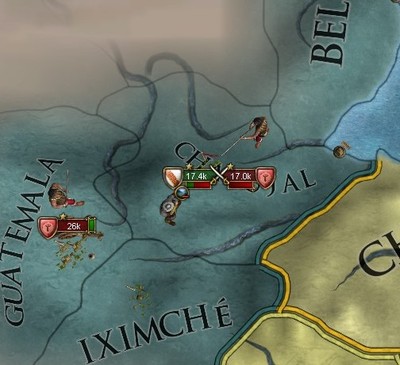
The natives put up a dogged fight, but their artillery was inferior and their tactics out of date, so after three hours of close fighting their lines were shattered, with the rest of the army crumbling soon after.

Upon seeing the obsoleteness of his forces for the first time, the Tlapanec Emperor ordered an immediate withdrawal, allowing Abdul-Razzaq to push into the Yucatan peninsula and capture large swathes of land almost unopposed.
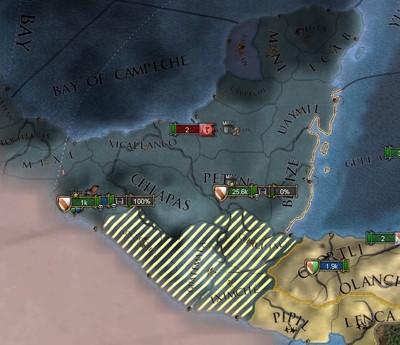
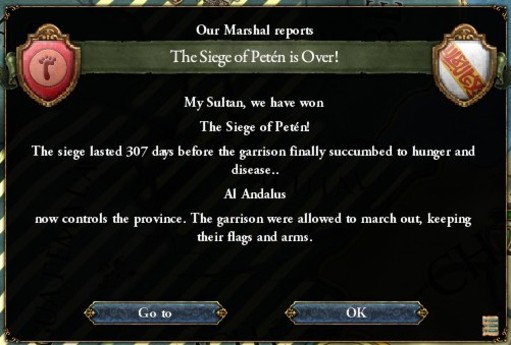
The next few months flew past with the mercenaries pillaging and ravaging the Yucatan peninsula, but steadily making their way towards the Tlapanec capital. As Abdul-Razzaq had expected, the native armies pushed south again upon hearing the news, allowing him to ambush and pin down a large army in the valley of Mixtec.

Abdul-Razzaq had wisely spent the past months scouting terrain all along the peninsula, slowly coming to understand its merciless jungles and rocky peaks, its snaking rivulets and humid weather. He'd managed to gather enough information to launch a surprise ambush and capture the Tlapanec army unawares, slaughtering almost 14,000 natives with relatively few losses of his own.
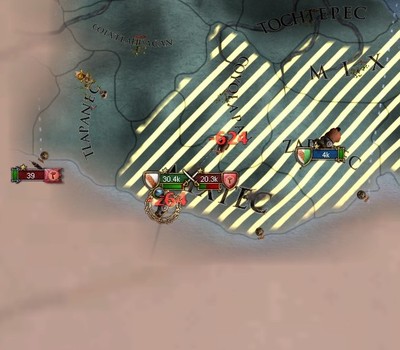
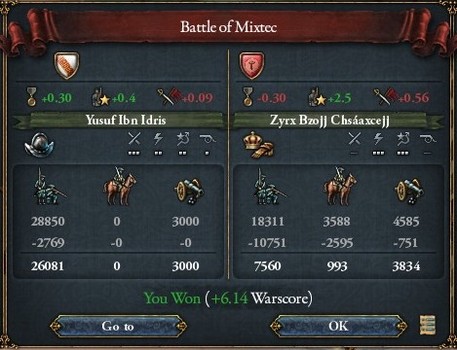
The native army now virtually annihilated, Abdul-Razzaq was able to complete his occupation of Yucatan. He ventured north to crush a few Tlapanec attempts to rebuild their forces, but most of his time was dedicated to capturing the remaining fortresses in the peninsula.
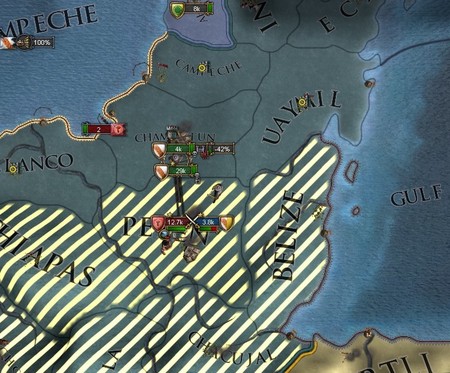
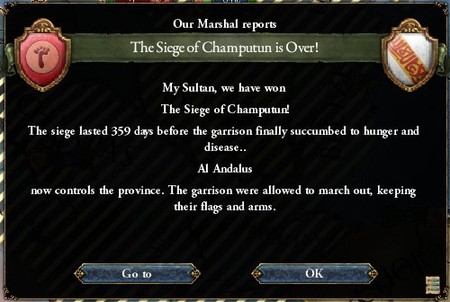
Late in 1604, the aging general finally sent word to the Majlis that his victory was complete. Sultan Hafid himself played a large part in the peace conference, forcing the Tlapanec Emperor to cede several border fortresses, as well as pay war reparations.
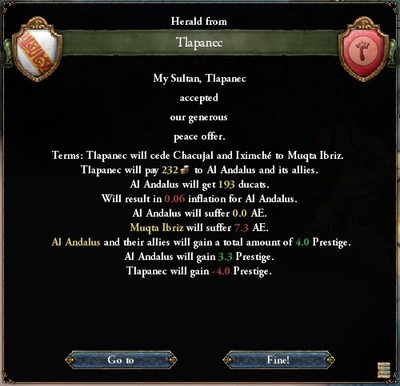
These war reparations were put to good use by the Sultan, who paid off the last of the accrued loans and finally making the crown solvent once more.
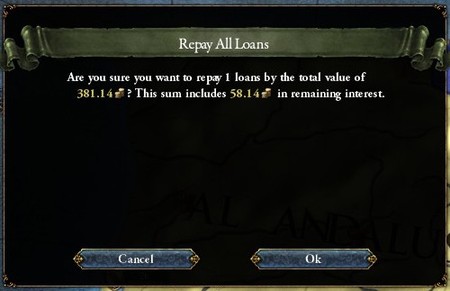
It wasn’t long before Hafid set the mercenary army to another task, however. The sultanate was still not able to field an army of its own, but the Majlis was determined to regain its lost standing and prestige, and the only way to do that was to successfully challenge another European power.
Sultan Hafid agreed, and set his eyes on Aragon, a tiny principality that had only survived because of the constant rivalry between its two powerful neighbours. With the truce between France and Al Andalus still standing, however, Hafid felt secure enough to go on the offensive again.
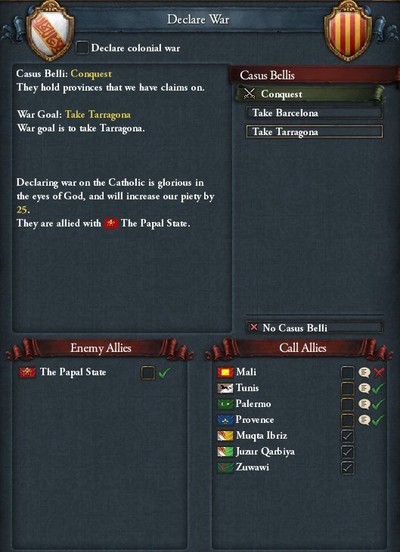
The mercenaries marched across the border just as the summer of 1606 broke, pushing straight for Barcelona. As usual, Abdul-Razzaq led the attack, successfully coordinating the different wings of his army as they enclosed and surrounded their Aragonese foes, utterly destroying the army within hours.
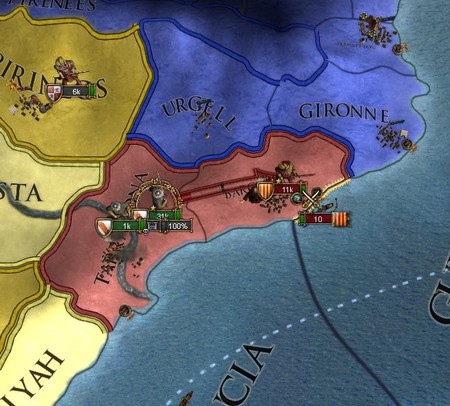
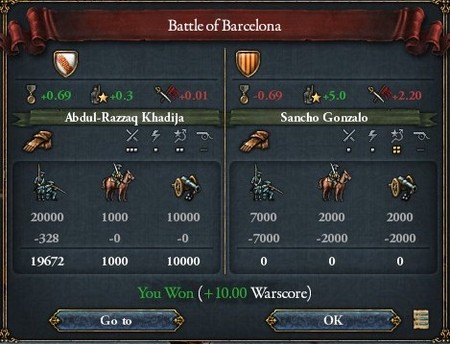
With the Aragonese army wiped out, Abdul-Razzaq then lay siege to Barcelona itself. The city held out for far longer than anticipated, but after several long months of being surrounded on land and blockaded at sea, its starving garrison finally capitulated and surrendered.
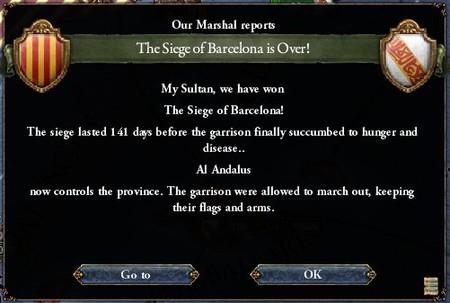
Sultan Hafid himself marched into Barcelona on a great white stallion to declare his victory. Much to his dismay, however, King Alfonso of Aragon had managed to escape his city during the chaos of the sack.
Hafid immediately tasked his navy to capturing the fleeing king, with a large battle breaking out along the coast of Narbonne, a battle which could only ever end one way.
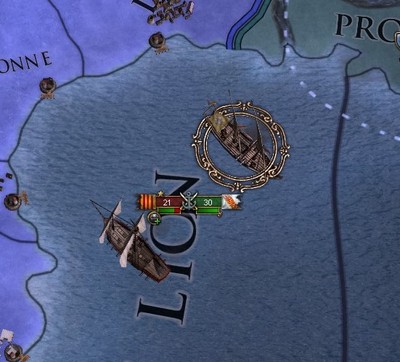
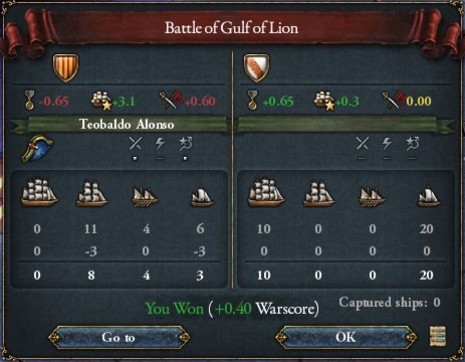
Still, Alfonso managed to vanish under cover of dark, passing Andalusi patrols unseen on a tiny galley. He quickly made his way across the Mediterranean and into the protection of his only ally, Pope Pius.
Enraged upon hearing the news, Sultan Hafid sent his mercenaries towards Italy. Once Abdul-Razzaq secured the permission of the Italian King to operate on his land, he managed to pin down the tiny Papal army and demolish it in a short battle.
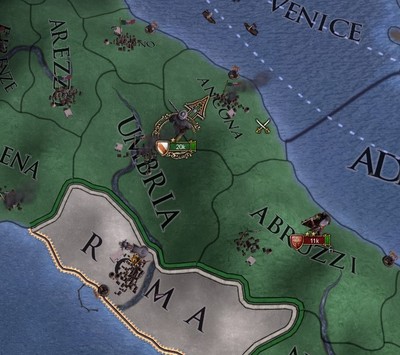
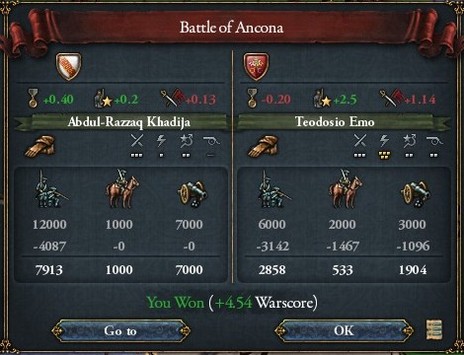
Hafid then instructed his high-ranking general to march on Rome itself, which fell after a short siege. The Sultan let his mercenaries ransack the holy city with impunity, drawing angry protests and vengeful promises from much of the Catholic world, small as it was.
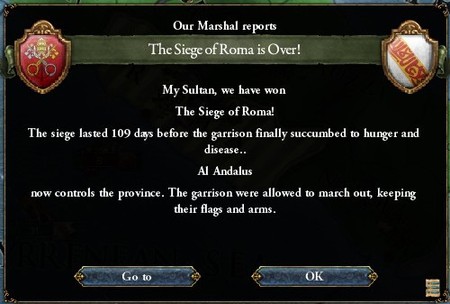
Nonetheless, Sultan Hafid had what he wanted, and King Alfonso was transported back to Qadis in chains. With his victory finally secure, he forced Alfonso to officially surrender the entirety of his principality, in addition to conceding massive war indemnities.
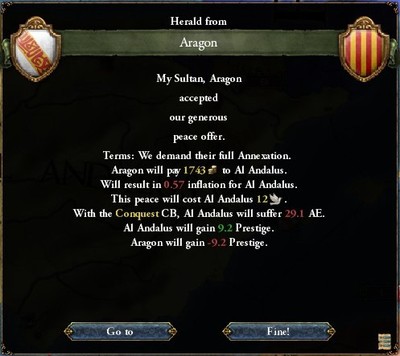
Sultan Hafid ensured that the peasants knew who had truly one the war by dismissing Abdul-Razzaq from his position as general, worried about his growing influence and fame.
The Sultan knew just how valuable the veteran commander was, however, so he made sure that Abdul-Razzaq was not insulted or humiliated. Instead, he was awarded the newly-created position of "Supreme Commander", the chief general and advisor to the Sultan during times of war, but a mere honorary title during times of peace.
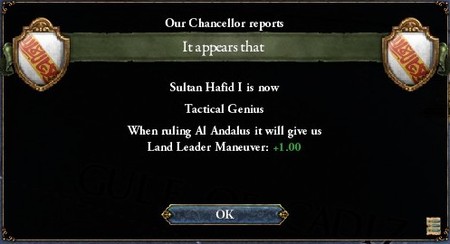
With the New Taifas in power and the Sultan’s interest in the military piqued, the army made massive advancements over the next few years, of the like not seen in decades. The mercenaries were finally dismissed and replaced with young soldiers, raised and educated in special barracks, trained to march in formation and with discipline and instructed in how to operate chambered demi-cannons. Hafid knew that he would need a powerful army to realise his ambitions, so he invested as much money as was required.
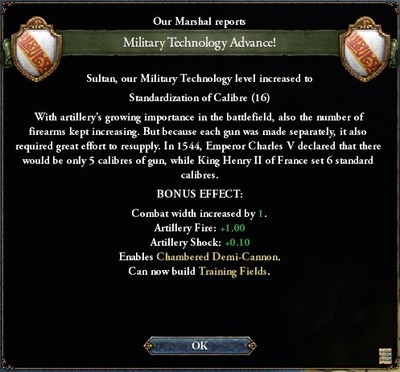
The Ulema continued their policy of sending missionaries to Catholic-majority cities, enticing large parts of their population to convert through harsh tax policies and promises of rewards.
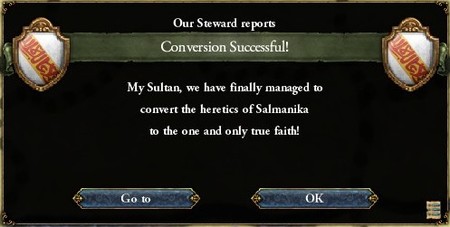
Sultan Hafid himself didn't support their efforts, he saw the value in having a Christian population, not least because it gave him a reason to institute the Jizya tax and widen his tax base. He needed the Majlis on his side if he was ever going to set his plans in motion, however, so he allowed them to continue their work unopposed, albeit limited to non-Dhimmi cities.
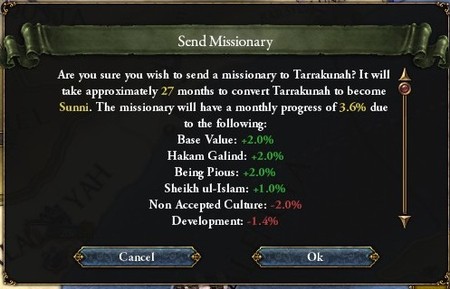
In the north, meanwhile, the King of France issued a strong diplomatic protest in reaction to Hafid’s annexation of Aragon. The truce between the two kingdoms was still in effect, however, so he could go no further than that.
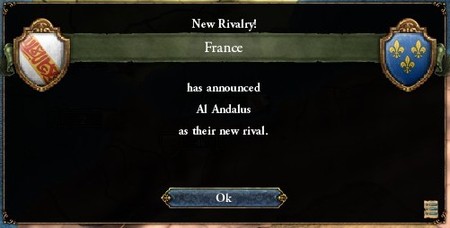
Evidently looking for someone to bully, the King decided to further expand his empire into the Low Countries instead, large parts of which he’d already conquered during the League War.
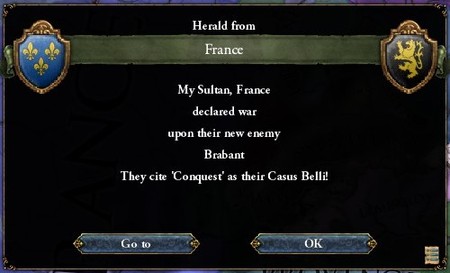
To his surprise, however, a considerable coalition suddenly leapt into action upon his declaration of war. With tens of thousands of soldiers from Ireland to Silesia suddenly marching on France, this war would not be nearly so easy one might have expected.
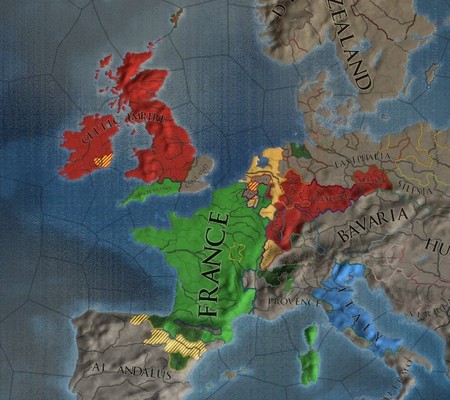
Hafid’s attention was drawn south again soon afterward, however, with the outbreak of a large revolt in Barcelona, led by a distant cousin of the former king Alfonso.
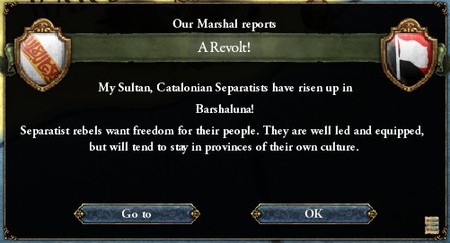
After appointing his Supreme Commander to lead the untested army, Hafid dispatched him to crush the rebels in their first offensive. The Mubaziric Reforms proved their immense value as the rebels were mowed down with ease, hopeless against this latest generation of the Mubazirun.
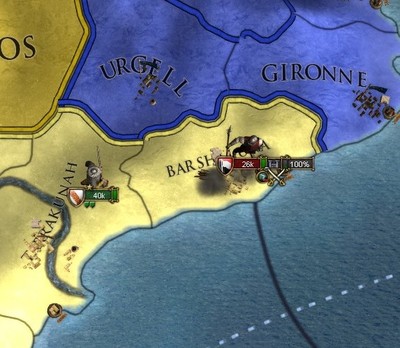
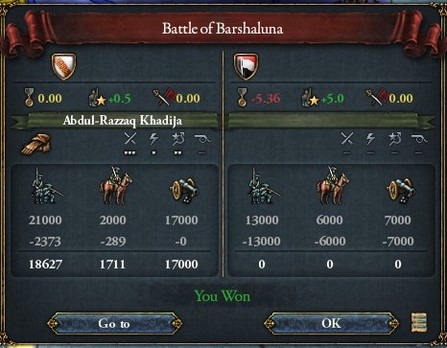
With that, a tense peace returned to Al Andalus. The following years passed slowly, with Sultan Hafid somehow finding the time in between his war plans and domestic concerns to sire a son - Hakam.
The New Taifas, meanwhile, were engaged in building an alliance network against Andalusia’s two primary rivals: Morocco and France. These efforts bore fruit in 1612 with the signing of an alliance with the Malian Empire, so that Al Andalus effectively had Morocco surrounded from three different directions.
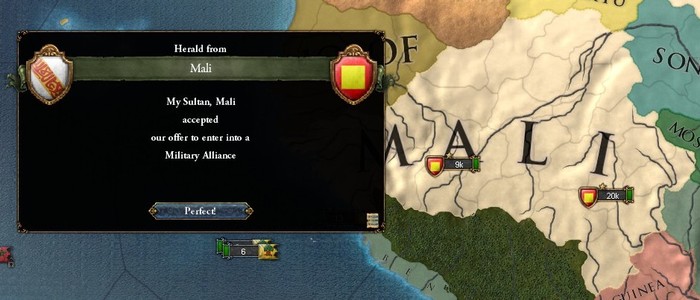
Considerably more important was the arrival of diplomats a few months later, however, from the distant Grand Duchy of Bavaria. Utterly broken after his decisive defeats in the League War, the emperor-turned-duke of Bavaria proposed an alliance between their two powers, aimed at restricting the expansion of France.
Sultan Hafid accepted without hesitation, securing anther vital step in achieving his ambitious goals.
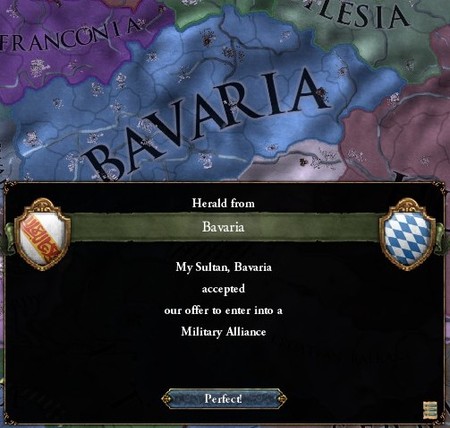
In the far west, meanwhile, a coalition between two factions in the Majlis managed to pool enough money to continue expansion in the new world. Several new colonies thus became self-sufficient by 1613, with the Majlis handing day-to-day governance of them over to the Muqta of Ibriz.
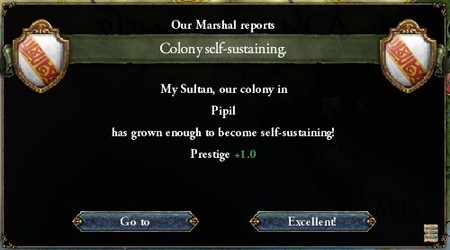
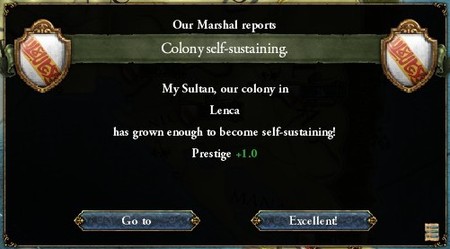
Exploration of the vast continent continued, and early in 1614, a small scouting party chanced upon a series of massive gold mines, hidden between the indistinguishable crags along the coast of Ibriz. With their long-sought gold finally found, the League of Merchants quickly swept in to claim the mines, sure that the next few years would see many in their ranks greatly enriched.
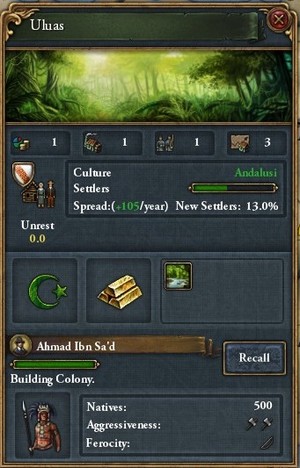
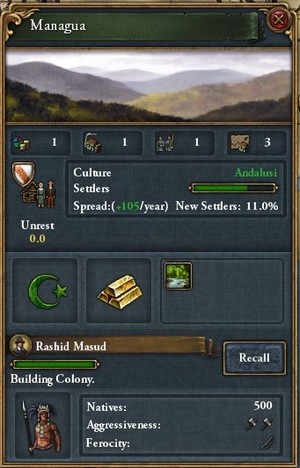
By 1615, everything between the Tlapanec Empire and Panama was under the control of Andalusi dependencies, with the rival colony of New France blocking further expansion into the southern continent.
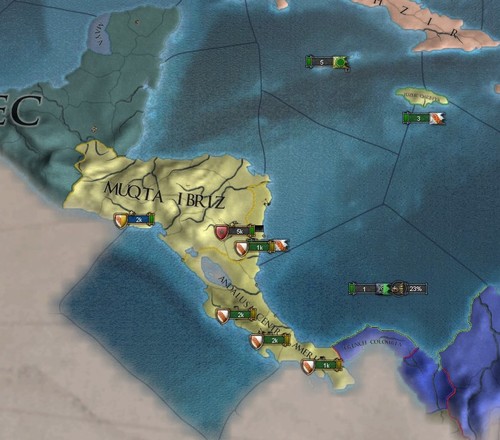
Back in Iberia, meanwhile, Sultan Hafid had been engaged in massive construction efforts. He had not only channeled the newfound wealth of Gharbia into the army, but also dedicated vast sums of gold into building Galleons, titanic four-masted capital ships sure to cement Andalusi control of the seas.
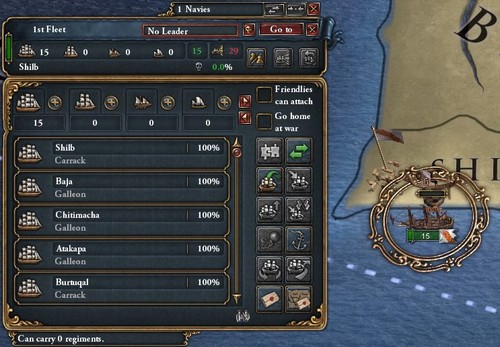
And in June of 1615, the long-awaited truce between Al Andalus and Castille finally came to an end. Sultan Hafid sent his new, yet-untried armies northward, where they prepared to launch a coordinated invasion of the small principality.
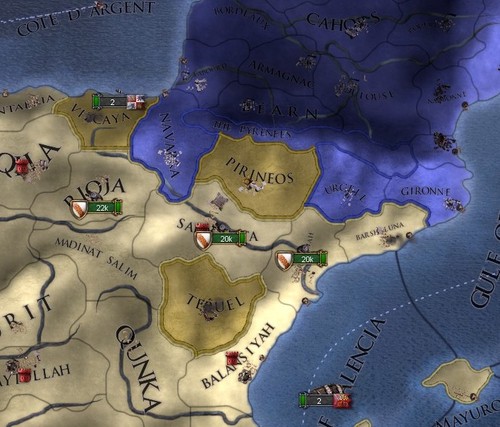
Unfortunately for Hafid, however, it was not meant to be. Mere days before the war was set to begin, the King of Castille announced that he would be ceding his title to the French King, directly violating the terms of the truce in what was becoming an infuriatingly-common occurrence. It was clear that French promises could not be trusted.
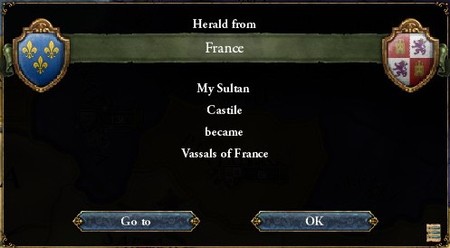
An enraged Sultan Hafid was forced to step down by the Majlis, who did not desire another war with France. Shortly afterwards, however, Andalusi spies in France brought some much-needed good news.
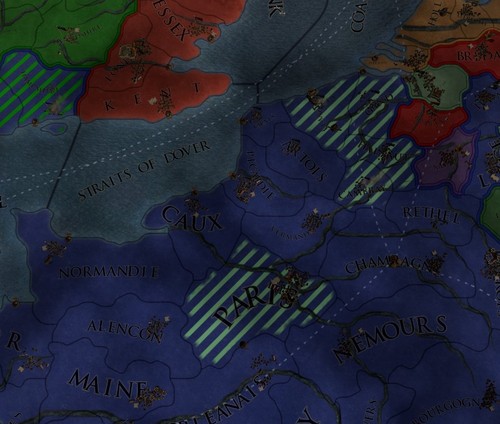
Apparently, the war in Europe had taken a turn. After being crushed by the combined forces of the Celtic-German coalition, the King of France was forced to call for a massive retreat, falling back to friendly territory and reaching out for negotiations. The allies refused to accept any attempts at white peace, however, pushing westward on a massive offensive of their own, one that ended with the capture of Paris itself.
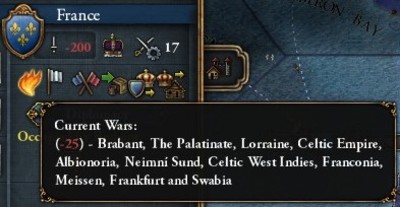
His anger forgotten, a new plan began forming in Sultan Hafid’s head. His grandmother had sculpted him into a crafty, opportunistic man, one that would do anything it took to realise his ambitions...
And Hafid’s ambitions were towering. They went beyond symbolic victories on the battlefield or pointless arguments in the Majlis Assembly, his eyes were set far higher than that, towards preeminence and unrivalled supremacy, towards absolutism and unfettered power, towards empire-building and global influence. He was determined to see his very name chiseled into history - Hafid the Great!
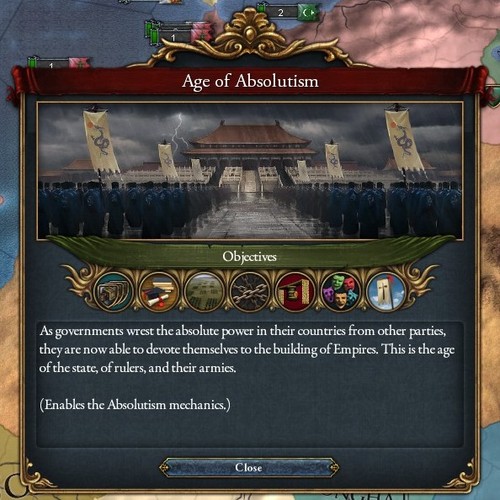
World map:
